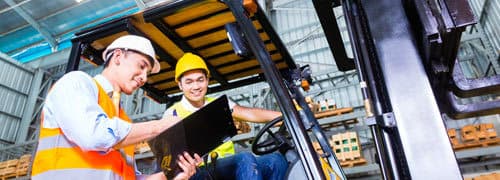Forklift Safety Training: Your Questions, Answered
Home delivery and remote work have given our industries a major boost. I expect demand to continue growing over the next few years, as many of you do as well.
Those who prepare now, who have the skilled workers for storage, shipping, and distribution, will win big.
What's one way we can prepare? Forklift training. Build and maintain a fleet of skilled operators, ready & certified. Then you're in a great position to meet demand.
The Need for Safe Forklift Operators Keeps Growing
According to Indeed.com, forklift certification is one of the 20 most-requested certifications by employers. That's a pretty clear indication of the value forklift operators have in our shipping & warehousing industries, isn't it?
OSHA requires forklift training for this certification. Which makes safety training classes necessary for your continued operation.

That's why we're talking about forklift training now, in November. Consider this your 2021 reminder – schedule your operators for next year's safety training so it's off the list!
To make scheduling training easier, here's a reference you can use. We collected questions asked by class attendees & customers throughout the year. Four of them kept coming up, so we've included them below with answers.
If someone asks you these questions, you'll have a good response ready!
Q&A – The 4 Most Commonly-Asked Questions about Forklift Training, and Their Answers
1. Why must we train employees on forklift use?
Federal law says that forklift operators must receive safety training. You'll find this law under Section 1910.178 found at www.osha.gov. Cal OSHA enforces the federal requirements, according to Section 3668 in their Title 8, found at www.dir.ca.gov.
Why should you care? Fines for not training employees can range in the tens of thousands for companies. Liability lawsuits for injured employees can run into the millions. Supervisors even risk personal liability lawsuits and criminal charges, if they knowingly let untrained operators work under them!
2. How often must I train my employees?
According to Regulation 3668, paragraph (d) 2, you have up to three years to retrain your employees. However, we usually recommend annual refreshers. Not only does it introduce newer technology, but it helps you stick to higher standards.
If you're an ISO 9000 or above company, or have government contracts, you must audit employee training annually. As a result, auditors sometimes mandate training every year, in order to maintain your company's status. Check with your auditor for their standard.
3. How do COVID restrictions affect safety training classes?
While safety training classes occur in groups, they don't need much modification to adhere to lockdown restrictions. The most important elements are:
- Direct training on the forklift type you'll operate, like a sit-down or stand-up forklift.
- Classroom-style learning, either in person or online.
- Written exams.
Lockdown restrictions don't change those processes. We implemented mask requirements, distancing between attendees, and wiping down forklift equipment between uses. This satisfies COVID restrictions and keeps attendees safe.
None of this affects the quality of the safety training either. We've maintained our class schedule all year under these conditions.
4. What types of training programs are available?
Think of safety training programs in three parts.
First: New Operator Training, for workers without forklift experience. This class takes place across two days. The first 8-hour day consists of classroom instruction, while the second day gives 8 hours of hands-on driving instruction on several types of lift trucks. The new operator gets the knowledge and confidence to operate a forklift safely in your workplace.
Second: Refresher Training, for operators with forklift experience. These classes consist of Oral (classroom) evaluation, a written test, and hands-on evaluation as required in CAL OSHA regulation 3668 paragraph (3). It normally requires four hours to complete.
Third: Train the Trainer Class. This class trains one of your employees to train your team on forklift safety. This is the most economical and convenient way to comply with the training requirement.
A Train the Trainer class requires 8 hours of instruction. It’s customized to your equipment and work environment. Trainers learn about:
- The laws and regulations for lift trucks,
- Classroom instructor techniques,
- Safe operation of electric and internal combustion forklifts,
- Pre-shift Inspections, and
- How to conduct hands-on evaluations.
Trainers receive a Reference Manual, a Books Test, and Videos…everything they need to train as soon as they return to your location.
Unlike other companies that require trainers to come back every two years, we follow the letter of the law as required in Regulation 3668 paragraph (4):
"All operator training and evaluations shall be conducted by persons who have the knowledge, TRAINING, and experience to train powered industrial truck operators and evaluate their competence."
Nowhere in that regulation does it say you must come back to us for a fee. That's why we provide your trainer with ongoing support, to keep your programs up-to-date and your people safe.
Invest in Forklift Safety Training for 2021 Gains
I hope this answered a few of your own questions about safety training's usefulness.
Cromer offers all of the above training classes at several of our locations. We train in English and Spanish, so the maximum number of people receive important training.
To schedule your team's 2021 training, call Cromer at 800-464-3225 ask for Training.
Until next month!
Marshall Cromer, The Forklift Boss
Cromer Material Handling


